MercoPress. South Atlantic News Agency
Tag: International Monetary Fund
-
Tuesday, August 28th 2018 - 09:02 UTC
Argentine economy expected to contract 1% this year and rebound 1.5% in 2019
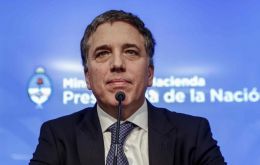
Argentina’s economy is expected to contract 1% in 2018, but grow by at least 1.5% next year, Minister Nicolas Dujovne told reporters on Monday. Dujovne said the government was maintaining its fiscal deficit target of 2.7% of GDP for full-year 2018. The government also expects a current account deficit of 3% of GDP in 2019, he said.
-
Friday, August 24th 2018 - 08:50 UTC
Argentina’s economy contracts in June for the third month running
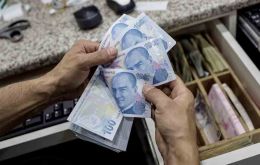
Argentina’s economy contracted 6.7% in June compared with the same month last year, and 1.3% compared with May, government statistics agency Indec said on Thursday. June was the third consecutive month of decline following 5.2% in May and 0.6% in April.
-
Wednesday, July 4th 2018 - 08:13 UTC
Argentina reveals financial needs; stock market and the Peso rebound
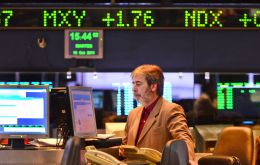
Argentina will need to raise a net US$ 8 billion in the domestic debt market in 2019 to meet financing needs that include a US$ 7.4 billion primary deficit and US$ 25 billion in debt principal and interest payments, according to a Treasury Ministry document.
-
Tuesday, June 26th 2018 - 09:17 UTC
Argentine public service unions strike to protest IMF deal halts the country
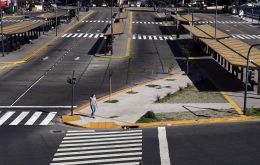
Argentina ground to a halt on Monday as public service unions blocked road, rail and air transport with a nationwide 24-hour strike in protest at the government's latest deal with the International Monetary Fund. In a massive show of force against the conservative government of President Mauricio Macri, organizers said at least one million workers were taking part in the industrial action which halted trains, subways, buses and flights in Latin America's third-largest economy.
-
Tuesday, June 26th 2018 - 08:35 UTC
Latest member to join OPEC expects to raise oil production by 65%
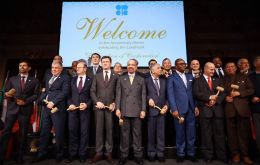
The Republic of Congo expects to raise oil production by as much 65% this year as two new projects come on stream, Hydrocarbons Minister Jean-Marc Thystere-Tchicaya said.
-
Wednesday, June 20th 2018 - 08:31 UTC
Global Index decides on Wednesday if it includes Argentina and Saudi Arabia

Global index compiler MSCI is considering including Argentina and Saudi Arabia in its emerging market indexes at a review of its widely-tracked benchmark on Wednesday, and could potentially announce candidates that may join its indexes in future.
-
Friday, June 15th 2018 - 10:25 UTC
IMF report warns Trump administration on trade, tariffs and budget deficits

The International Monetary Fund said on Thursday that tax cuts will help fuel the U.S. economy this year and next. But it warned that growth after that will slide to levels just half of what the Trump administration is forecasting.
-
Thursday, June 14th 2018 - 22:14 UTC
IMF's Lagarde welcomes Argentina government’s economic policy plans
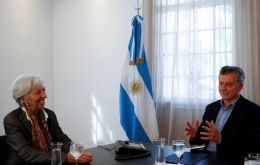
Argentine authorities have asked to use US$7.5 billion of the US$50 billion financing deal signed with the International Monetary Fund to fund their budget, IMF Managing Director Christine Lagarde said in a statement. Argentina’s Finance Ministry said in a separate statement that the funds would be sold on the market through pre-announced daily auctions conducted by the central bank.
-
Wednesday, June 6th 2018 - 08:45 UTC
China and Argentina reinforce financial links with increased currency swap arrangement
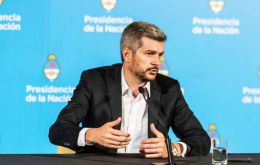
Argentina is looking to expand an existing currency swap arrangement with China, as Buenos Aires looks to stabilize the economy one month after applying for financial aid from the International Monetary Fund. In an interview with the Financial Times, Argentina’s Chief of Cabinet Marcos Peña, said “we have an active swap with China that the previous government left us and we will try to make it bigger.”
-
Monday, June 4th 2018 - 08:49 UTC
Colombia renews flexible credit line of US$ 11.4bn with IMF
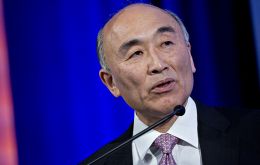
In a continuation of a previous arrangement, the International Monetary Fund (IMF) has approved Colombia for a flexible credit line of US$ 11.4 billion. The new two-year arrangement replaces the pre-existing credit line, which has now been cancelled. Colombia will continue to see the funds as precautionary to be used only in if economic conditions worsen due to an external shock or other emergency, according to the IMF.
